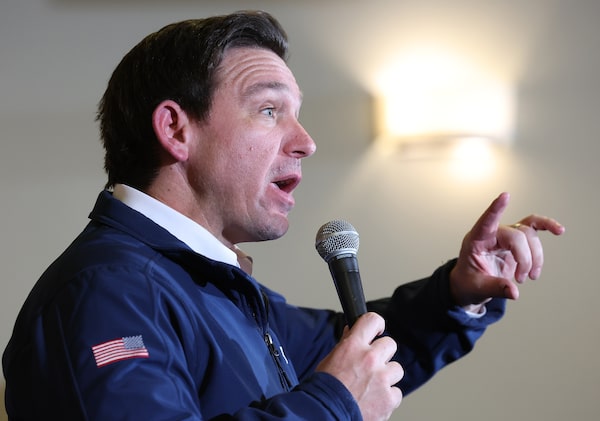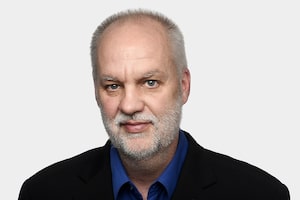
Republican presidential candidate Florida Gov. Ron DeSantis speaks during a campaign event the District Venue on Jan. 14 in Ankeny, Iowa.Kevin Dietsch/Getty Images
There is no shortage of hypocrisy and grandstanding in U.S. politics.
A plan by Florida Governor (and Republican presidential hopeful) Ron DeSantis to import prescription drugs from Canada is a striking example of this propensity for talking out of both sides of one’s mouth for political gain.
Brand-name prescription drugs cost almost three times as much in the U.S. as in Canada, for a host of reasons, including patent laws. The U.S. does not negotiate prices with manufacturers, nor does it regulate drug prices (as all other Western countries do).
Mr. DeSantis, a right-wing Republican, supports these “free market” approaches.
So, what is he doing instead? Proposing a backdoor approach, essentially importing Canada’s price controls and pretending that makes him a smart shopper.
The idea of raiding Canada’s medicine cabinet has existed for decades. As far back as 1999, and as recently as 2019, maverick U.S. Senator Bernie Sanders has been leading caravans of Americans to Canada to purchase cheaper drugs such as insulin.
Small-scale purchases like that are not a problem. But in 2020, then-U. S. president Donald Trump began openly trumpeting a massive drugs-from-Canada scheme, urging states to buy in bulk from their northern neighbour.
President Joe Biden also backs this ridiculous approach. But at least his administration has also taken some significant legislative initiative, allowing U.S. Medicare to negotiate prices for some drugs – an approach that will save an estimated US$98.5-billion over the next decade.
Regulators at the U.S. Food and Drug Administration have long blocked state initiatives, saying imported drugs could pose a risk to public safety by opening the door to counterfeit drugs.
The FDA spent more than a decade prosecuting and shutting down online pharmacies, including those based in Canada (or pretending to be based in Canada), because they were a haven for counterfeit and unsafe drugs. This concern is ridiculous if you’re buying from Canadian manufacturers, most of which are subsidiaries of large American and European pharmaceutical companies; it’s all part of the fiction that the American manufacturers are somehow unique and special.
But on Jan. 5, the FDA granted Florida the right to import a small number of drugs – for treatment of HIV, prostate cancer, and mental health conditions – from Canada for two years, with some restrictions. It is estimated that this could save the state US$180-million in the first year alone. At least eight more states plan on following suit and buying drugs from Canada.
From a Canadian perspective, this is a non-starter.
Practically speaking, Canada, a country of 40 million, cannot produce enough drugs to supply the U.S., a country of 332 million. Even supplying drugs to Florida – which has half the population of Canada – could trigger major domestic shortages.
Very few drugs are actually manufactured in Canada. Our drug supply is largely imported from the U.S., Europe and Asia.
Not to mention that many Canadian drug manufacturers have agreements with wholesalers that explicitly forbid exporting their products to the United States.
The industry itself also fiercely opposes the scheme, both in the U.S. and in Canada. Innovative Medicines Canada, which represents brand name manufacturers, said it would make every effort to “safeguard” domestic supply. Pharmaceutical Research and Manufacturers of America, the industry lobby group in the U.S., called Florida’s plan “reckless” and vowed to sue if it proceeded.
Canada also has regulatory restrictions on exports designed to protect the domestic market, rules that it bolstered in 2020 when Mr. Trump started greedily eyeing local supplies.
Federal Health Minister Mark Holland has made it clear Canada won’t allow the U.S. to put Canada’s drug supply at risk. Drug shortages are already commonplace, and large-scale exports would exacerbate the problem.
“We’re going to do everything in our power to make sure that another country cannot be given the ability to pillage our health system for its own benefit,” Mr. Holland said.
Health Canada, for its part, warned that it could revoke the licence of any manufacturer that causes a drug shortage in Canada by exporting its products.
All this is to say that Florida’s much-ballyhooed plan to import drugs from Canada is unlikely to happen.
But that doesn’t really matter because it’s designed to give the illusion of action, not result in actual change.
If the U.S. really wants to import something from Canada, it should be the notion that if you want cheaper drug prices, you have to pro-actively negotiate and regulate domestically, rather than rifling through your neighbour’s medicine cabinet.
 André Picard
André Picard